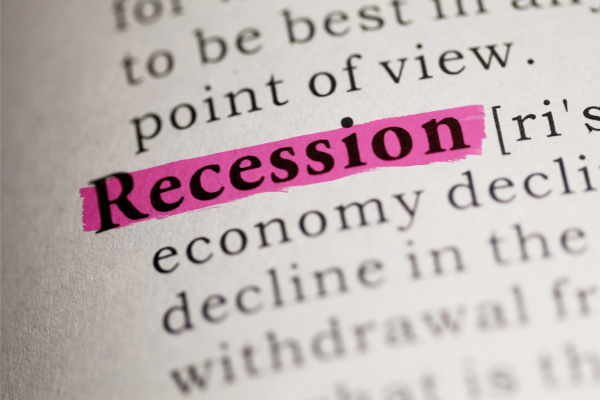Many people are wondering whether the economy is heading for a recession or if we’re already there.
But what is a recession? What causes a recession?
Let’s take a look.
What Is A Recession?
The National Bureau of Economic Research (NBER) defines a recession, or economic contraction, as a significant drop in economic growth and activity spread across the entire economy for at least several months.
It’s visible in industrial production, employment, real income, and wholesale-retail trade.
A recession is also thought to occur when businesses stop growing, the GDP (gross domestic product) drops for two straight quarters, and the unemployment rates rise.
In economics, a recession occurs when an economy experiences two successive quarters of negative growth.
Recessions simultaneously concurrently have clear and ambiguous characteristics and causes.
In essence, recessions are a collection of business failures being realized.
Companies are compelled to reallocate resources, reduce production, stop making losses, and lay off workers.
These are the obvious and plain reasons why recessions occur.
Depending on the slump’s severity, a recession’s length might vary significantly. As an illustration, the Great Recession was a major recession that lasted for over nine years.
On average, recessions last between one and three years.
What Are The General Causes Of A Recession?
The significant economic theories behind recessions focus on financial, psychological, and fundamental economic factors that lead to the cascade of business failures that comprise a recession.
Some theories examine long-term economic trends that lay the foundation for a recession in the years leading up to it.
Others look only at the immediately visible factors that appear at the onset of a recession. A number of these various factors may contribute to any particular recession.
Financial factors contributed to the economic downturn during the 2007–2008 U. S. financial crisis.
Overly aggressive lending practices and excessive borrowing by marginal companies and individuals led to a massive buildup of risk in the financial system.
The expansion of the monetary base and credit by the Federal Reserve and banks drove this process to extreme levels, stimulating a risky asset bubble.
During booms, artificially suppressed interest rates distort the structure of relationships between businesses and consumers.
They do so by making business projects, investments, and consumer decisions that are interest rate sensitive (such as the decision to buy an expensive house) seem much more attractive than they are.
The failure of these decisions when rates rise to reflect reality constitutes a significant component of the rash of business failures that make up a recession.
Are We In A Recession?
The first domino in this economic cycle was an increase in prices last year. That’s called inflation.
Inflation worsened throughout 2021.
Almost everything got more expensive. First, car parts became more costly, and then cars became more expensive.
A lot of products were similarly disrupted.
The White House and Federal Reserve became concerned about high inflation, but their efforts to control it didn’t do much.
They knew inflation was hurting the economy but didn’t know how bad it would get.
They tried to slow down inflation, but it just kept growing.
The Federal Reserve is responsible for keeping inflation under control. One way the Federal Reserve has done this is by raising interest rates, which means it costs more to get loans.
This causes a drop in consumer spending.
It appeared that they had succeeded at first. Many believed that inflation would decrease.
The Russian invasion of Ukraine, however, led to numerous economic issues. In turn, inflation gained momentum.
The stock market has been plummeting for quite some time now. It wiped out a lot of wealth altogether. That can cause a recession.
Consumers and companies alike became anxious about the future. Economic uncertainty made them reluctant to spend money and invest.
Those actions can help lower inflation, but they didn’t work this time.
When Russia invaded Ukraine, gas prices rose, which caused the price of many other things to increase. As a result, recession risks increased, too.
So what happens next?
Two scenarios could happen.
If the Federal Reserve plays its cards right, it may be able to prevent a recession from starting.
They could slow the economy without causing it to contract altogether.
If this happens, companies don’t end up laying workers off, and inflation comes down, people feel more assured about the economy, and consumer confidence increases.
The other possibility is that the dominoes continue to fall. When businesses lay off employees, the families affected reduce their spending.
If consumers stop making purchases, more businesses will have to lay off employees, and the vicious cycle continues.
Which Way Will Our Economy Go?
How successfully the Federal Reserve can reduce inflation, stabilize the economy, and foster growth will only become apparent with time.
Interest rate increases from the central bank are anticipated to be significant, and there is proof that they already have an effect. For instance, the housing market is slowing down without completely collapsing.
And while there haven’t been any widespread layoffs, several labor market segments are slowing down.
New highs in inflation are being reached, and dominoes are still falling.
Politicians are hoping that this series of circumstances will finally settle. They just don’t know when. Or how.
Contact The Shunnarah Trail Attorneys For Your Legal Needs
Many people are feeling the effects of the increasing costs of goods. Wheter or not we are classified to be in a recession, many Americans are feeling the struggle. If you are being harassed by debt collectors, we may be able to help.
Alexander Shunnarah Trial Attorneys is known nationwide for providing exceptional legal advice and representation. We have helped over 60,000 clients recover over $1 billion. For a free consultation with a personal injury lawyer, call 1-800-229-7989. With our combined years of trial and complex litigation experience, our attorneys will fight harder than anyone else to get you the compensation you deserve.
References:
https://www.washingtonpost.com/business/interactive/2022/what-causes-a-recession/?itid=hp-top-table-main-t-5
https://www.investopedia.com/ask/answers/08/cause-of-recession.asp
